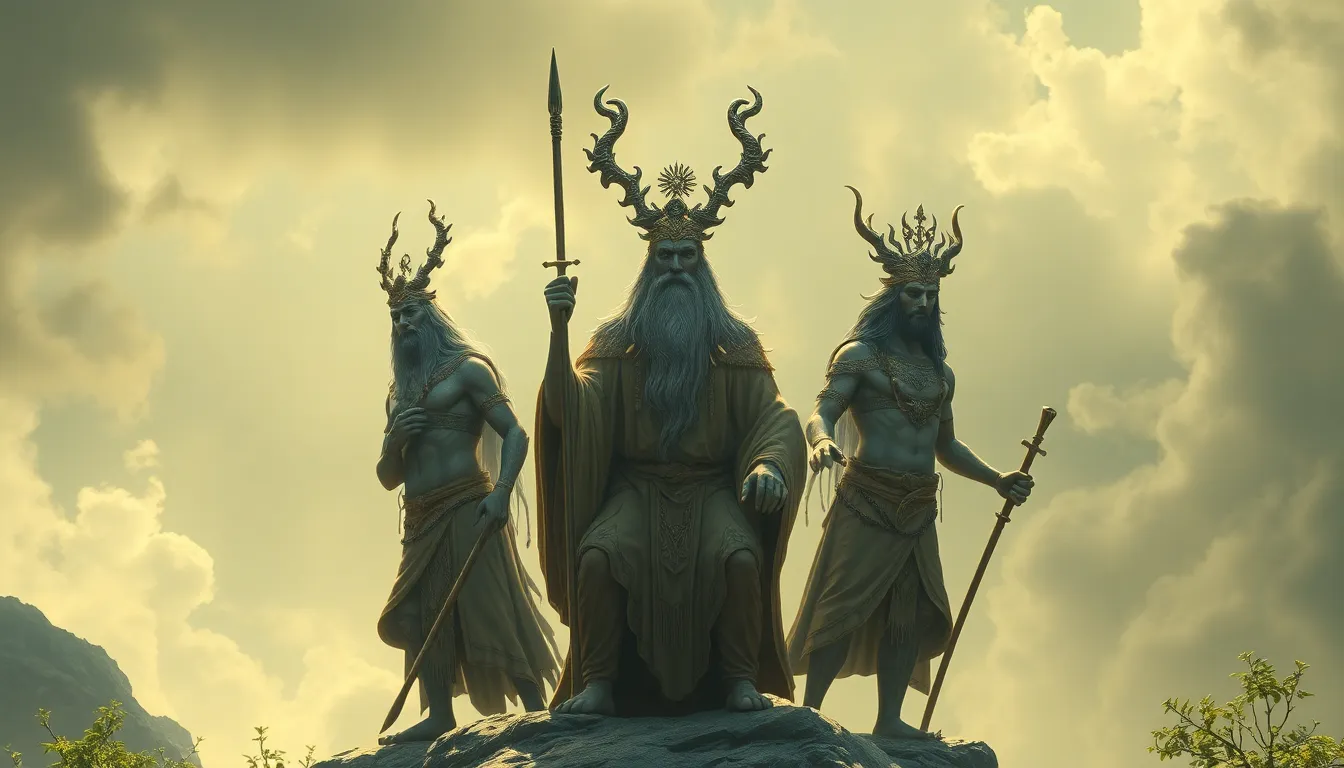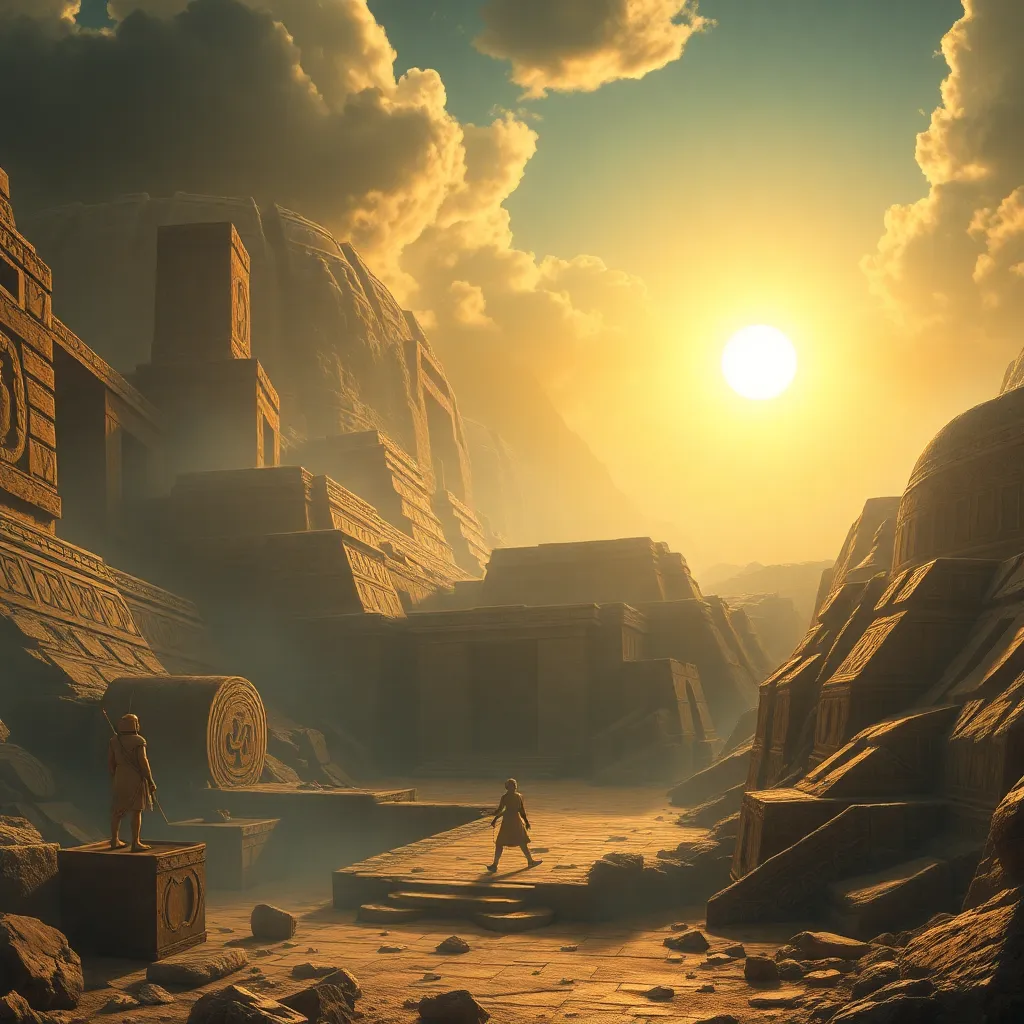The Guardians of Nature: Ancient Deities and Their Environmental Roles
I. Introduction
Throughout history, ancient deities have played a pivotal role in shaping the beliefs and practices of various cultures. These gods and goddesses were often embodiments of natural forces and phenomena, deeply intertwined with the lives of the people who worshipped them. Their significance extended beyond mere mythology; they were integral to understanding the environment and humanity’s place within it.
In this article, we will explore the importance of these deities in relation to the environment, highlighting their roles in agriculture, weather, water, and wildlife. By examining these ancient beliefs, we can gain insight into the reverence for nature present in many cultures and the lessons they offer for contemporary environmental challenges.
II. The Concept of Nature in Ancient Civilizations
Nature, as understood by ancient civilizations, encompassed the land, water, plants, and animals that formed the ecosystem around them. Different cultures defined nature in unique ways, reflecting their geographical and social contexts.
- Definition of Nature: In many societies, nature was seen as a living entity, a source of sustenance and spiritual significance.
- The Relationship with Humanity: Ancient peoples viewed themselves as part of a larger natural world, reliant on its cycles and rhythms for survival.
- Spirituality: Reverence for natural phenomena, such as the sun, moon, rivers, and forests, was common, often leading to the worship of deities that personified these elements.
III. Major Ancient Deities Associated with Nature
Across various cultures, numerous deities have been linked to nature, each with distinct roles and attributes. These gods and goddesses often personified various aspects of the natural world, from agriculture to weather to wildlife.
- Greek Mythology: Demeter, goddess of the harvest, and Poseidon, god of the sea, exemplify the connection between divinity and natural elements.
- Roman Mythology: Ceres, the Roman counterpart of Demeter, was similarly revered for her role in agriculture.
- Hindu Mythology: Prithvi, the earth goddess, and Varuna, the god of water, illustrate the rich tapestry of nature deities in Hindu belief.
- Indigenous Cultures: Many indigenous religions include nature deities that embody the spirits of the land, animals, and natural events.
IV. The Role of Nature Deities in Agriculture
Agricultural practices were deeply influenced by the reverence for deities associated with fertility and harvest. These deities were believed to have the power to bless crops and ensure bountiful yields.
- Deities of Harvest and Fertility: Demeter in Greece and Ceres in Rome were central figures in agricultural worship.
- Rituals and Practices: Ancient civilizations conducted various rituals, such as festivals and offerings, to honor these deities and seek their favor. For instance, the Eleusinian Mysteries in ancient Greece celebrated the cycle of planting and harvest.
- Impact on Agricultural Practices: The beliefs surrounding these deities promoted sustainable practices by emphasizing the need for balance and respect for the land.
V. Water Deities and Their Significance
Water is a vital resource, and many ancient cultures personified its sources through deities. Water deities were central to the survival and prosperity of civilizations, as they governed rivers, oceans, and rainfall.
- Overview of Water-Related Deities: Poseidon, the Greek god of the sea, and Oshun, the African goddess of rivers, are examples of deities that represented water.
- Importance in Belief Systems: Rivers and oceans were often seen as life-giving forces, essential for agriculture, trade, and transportation.
- Myths and Environmental Health: Many myths surrounding water deities highlight the importance of maintaining balance within ecosystems, warning of the consequences of pollution and disrespect.
VI. Weather Deities and Natural Phenomena
Weather has always been a significant factor in human survival, influencing everything from agriculture to daily life. Ancient cultures often personified weather phenomena through deities.
- Deities Governing Weather: Zeus, the Greek god of the sky, and Thor, the Norse god of thunder, were believed to control storms and celestial events.
- Cultural Significance of Weather: Changes in weather were interpreted as divine messages, and communities would hold rituals to appease these gods during droughts or storms.
- Myths of Natural Disasters: Many cultures created narratives explaining natural disasters as expressions of divine wrath, emphasizing the need for respect towards nature.
VII. Animal Deities and Wildlife Protection
Animals played a crucial role in the lives of ancient peoples, serving as sources of food, companionship, and symbols of various qualities. Many cultures honored deities associated with animals, emphasizing the need for coexistence and respect for wildlife.
- Overview of Animal Deities: Artemis, the Greek goddess of the hunt, and Anubis, the Egyptian god associated with mummification and the afterlife, illustrate the connection between deities and wildlife.
- Roles in Conservation: These deities often symbolized the balance between humanity and nature, promoting conservation practices and a deep respect for animals.
- Symbolism and Environmental Messages: Animals in mythology often embody traits such as strength, wisdom, and adaptability, serving as reminders of the intrinsic value of all living beings.
VIII. The Influence of Ancient Nature Deities on Modern Environmentalism
The teachings and beliefs surrounding ancient nature deities continue to resonate in contemporary environmental movements. The principles of balance, respect, and stewardship are crucial in addressing today’s ecological challenges.
- Ancient Beliefs Shaping Modern Views: Many modern environmentalists draw inspiration from the reverence for nature found in ancient mythologies.
- Reviving Ancient Practices: Practices such as permaculture and sustainable agriculture echo the teachings of ancient agricultural deities.
- Case Studies: Various environmental movements, such as those advocating for water protection, often invoke the wisdom of ancient water deities to emphasize their cause.
IX. Lessons from Ancient Deities for Today’s Environmental Challenges
Ancient deities offer valuable teachings that can guide contemporary society in tackling pressing ecological issues. Their stories and attributes remind us of the importance of balance, respect, and stewardship of the earth.
- Key Teachings: Many deities emphasize the interconnectedness of all life, urging humanity to recognize its role within the ecosystem.
- Importance of Balance: The concept of balance in nature is crucial; overexploitation of resources can lead to dire consequences, as warned by many myths.
- Respect and Stewardship: The reverence shown to nature in ancient cultures serves as a model for modern environmental ethics, advocating for responsible stewardship of the planet.



